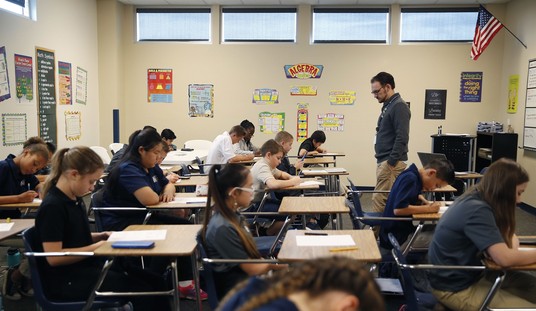Lefty Gomez once remarked that in baseball he would “rather be lucky than good”. A lot of Americans were unlucky on the night of September 11, 2012 in Libya. The Washington Times says that “as U.S. Africa Command waited for any order to rescue Americans on Sept. 11 at the besieged consulate and CIA annex in Benghazi, Libya, it was missing a key unit that the Pentagon gives every regional four-star commander — an emergency strike force.”
on that day, AfriCom, the Pentagon’s newest geographic combatant command, which is still in the building phase, lacked what is called the “commander in-extremis force,” said a senior special operations official.
“All geographic combatant commands have one allocated to them, except AfriCom,” the senior official said. “AfriCom’s is in the process of being established.”
That momentary gap proved a lucky break for the ‘mob’ of Libyan attackers who also knew the location of a “sensitive safe house or annex a kilometer away. It remains unclear to U.S. and Libyan officials whether the militants knew of that facility or just followed a U.S. convoy to it after the consulate attack.”
It was so secret that Americans in a security team sent from Tripoli to succor the consulate did not divulge the location of the annex to the Libyans who accompanied them. They arrived at the smoldering consulate even as fighting broke out in the annex some distance away.
A plane with an American security team from Tripoli arrived in Benghazi about 1:30 a.m., according to the Libyan account. The team found its way to the annex using global positioning devices. Libyans who accompanied the Americans to the scene weren’t told of the annex’s location because of its connection to sensitive programs, and the Americans didn’t give them the GPS coordinates or address. Libyans at an emergency operation center in Benghazi were also kept in the dark to the exact location.
As the U.S. and Libyan reinforcement team arrived from the airport, fighting broke out at the annex.
That assault, using rocket-propelled grenades and mortars, was described in U.S. and Libyan accounts as more sophisticated than the earlier attack on the consulate, and it appeared to involve militants with possible links to al Qaeda.
But somehow the ‘mob’ knew where the annex was, though whether by espionage or fortune is not as yet known. The attack on the annex was described by the NYT as “a catastrophic intelligence loss,” citing one source, “we got our eyes poked out.”
The eye poking has spread to the Levant. Jay Solomon, writing for the Wall Street Journal says “the assassination of Lebanon’s security chief a week ago robbed the U.S. and Europe of one of its closest allies in monitoring and countering the regional activities of Lebanon’s Hezbollah, as well as its backers in Syria and Iran, said U.S. and Arab officials.” And another array of intelligence sources go dark.
Brig. Gen. Wissam al-Hassan headed intelligence-gathering for Lebanon’s police force, the Internal Security Forces, which was among Beirut’s primary recipients of U.S. financial aid since mass protests forced Syrian President Bashar al-Assad to remove his troops from the country in 2005 …
In late August, according to Arab diplomats, Gen. Hassan visited Washington, where he held extensive discussions with the head of the Central Intelligence Agency, David Petraeus, and other senior Obama administration officials
Without these trusted sources whoever was behind these attacks — the administration is now willing to accept the possibility that an agency may be behind these actions rather than a mob — has not only partially blinded Western intelligence but puts them in a better position to feed them disinformation, especially in Lebanon, where much of the Lebanese government apparatus is under Hezbollah influence or control.
The problem with ascribing these events to an agency is it runs counter to the narrative that “Osama bin Laden is dead and General Motors is alive.” It’s much more comforting to think it’s all a run of bad luck. The Atlantic invoked the ‘fog of war’ to explain the administration’s belated response to events in Benghazi. In their view there is nothing to see. Events are simply that way because international events are always confusing.
Post-Gaddafi Libya itself was still chaotic, caught up in the fog of war, and indeed Ambassador Chris Stevens, at great personal risk, had journeyed to his old Arab Spring-era stomping ground in Benghazi to assess the situation himself. Still, Clapper recently told an annual conference of intelligence professionals that there was no warning to Stevens or anyone else that he was about to be targeted by an organized extremist attack. …
So in the ensuing days, the fog lifted only very gradually. The intelligence community did not see a clear way to explain the deaths of Stevens and three other Americans … No evidence has surfaced so far to support the idea that the Obama Administration deceived the public deliberately …
Even now, intelligence officials say, the full story is not known. It is not even clear that the video-inspired protests in Cairo were unrelated to the attack in Benghazi, because some of the extremists who attacked Stevens and his colleagues may have been provoked by watching the demonstrations on TV. Officials say they are still compiling a list of suspects.
What the Atlantic fails to point out is that the ‘fog of war’ is not an act of nature, like Hurricane Sandy. The ‘fogs of war’ are generated by man; in the imperfections in our own intelligence and also by enemy action. Ever since the beginning of intelligence the other side has tried to blind as part of its stock in trade. The Atlantic should spare a thought to why the enemy was so little hindered by the ‘fog’ on the evening of September 11, 2012 while America groped abut.
How did the mob know that Stevens was in the consulate? How did the rabble know where the CIA safe house was? How did a bunch of disgruntled video watchers know — or were they just lucky — that AfricaCom had no quick reaction force?
Ian Fleming wrote in Goldfinger: “Mr Bond, they have a saying in Chicago: ‘Once is happenstance. Twice is coincidence. The third time it’s enemy action.'” Bugs Bunny put it more succinctly: what’s up Doc?
Nothing Bugs. Though more suspicious minds might think we’re being set up for something.
Update: The new tagline. “When Obama called the SEALS, they got Bin Laden. When the SEALS called Obama, they got nothing.”
Belmont Commenters
How to Publish on Amazon’s Kindle for $2.99
The Three Conjectures at Amazon Kindle for $1.99
Storming the Castle at Amazon Kindle for $3.99
No Way In at Amazon Kindle $8.95, print $9.99










Join the conversation as a VIP Member